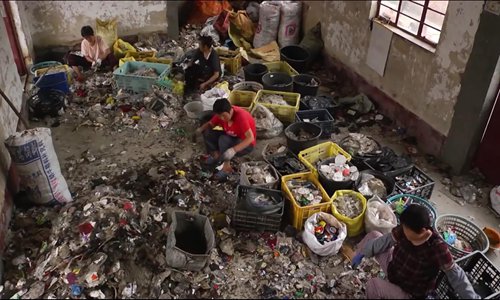
Screenshots of the trailer for Plastic China
Wang Jiuliang's award-winning documentary draws attention to environmental issues
Independent Chinese filmmaker Wang Jiuliang is causing quiet a stir with his documentary Plastic China.
After the film took the Special Jury Award in the First Appearance section at the International Documentary Film Festival Amsterdam in November, a shorter-version of the film released two years ago has gained renewed interest among Chinese who are growing increasingly concerned about pollution issues in China.
The 26-minute version of the film, which debuted on Chinese streaming sites in 2014, currently has a 9.5/10 on Chinese media review site Douban.
China is one of the largest importers of plastic refuse in the world.
According to data from the China Scrap Plastics Association, roughly 30 percent of the world's plastic scrap was recycled in the Chinese mainland in 2014, up from 20 percent in 2010, the Xinhua News Agency reported in 2014.
"If there are plastics, I believe right now markets are definitely going towards China, still," says Daniel Maher, a recycling director in the U.S., at the beginning of the short version of Plastic China.
While this may lead you to think that China must have some advanced way of recycling plastic, the reality is quite the opposite. Most recycling in the country is carried out by hand, leading to many workers and their families being forced to live in an environment contaminated by plastic. Due to long years of working at recycling plants, many workers are able to quickly distinguish from the hundreds of types of plastics by simply burning a sample, observing the smoke that it gives off and smelling the fumes.
The struggle workers face between not wanting to work with toxic substances but wanting to provide for their families is one of the major themes presented in Plastic China.
While the plastic recycling industry has provided new job opportunities for Chinese living in rural areas, they know it cannot continue for long in its current state, not that they think the government cares.
"There's too much going on that's neither reasonable nor legal… If our government is determined to make a difference, why not do it thoroughly?" says one interviewee in the documentary
"Look at who dumped these plastics on us. Japan, South Korea and Western Europe, these are all developed economies. How did the plastics get here in the first place?"
"Behind China's fast growing GDP are bloody truths that most of us have ignored. We are living in a time when corpses and bones are covered by beautiful appearances," Chen Chaoyun, a netizen from Shandong Province, commented in his review of the film on Douban.
Plastic China is not the first work Wang has made that attempts to call attention to environmental problems. In 2010, the former photographer turned his lens on garbage piling up around Beijing in his documentary Beijing Besieged by Waste.
Wang is not the only filmmaker who has devoted themselves to uncovering the cruel reality behind the country's economic success. As early as 2006, Canadian filmmaker Jennifer Baichwal's Manufactured Landscapes showed how electronic garbage and heavy metals were being handled in China regardless of the pollution it was creating, while Chinese filmmaker Zhang Zanbo's 2015 documentary The Road revealed the impact highway construction has had on local people's lives.
"On one hand, urban dwellers have enjoyed the benefits brought by rapid development and modernization. The progress China has made is known around the globe. On the other hand, countless lives, morals and culture, like sand in an hourglass, has gradually disappeared from society," writes one review of the book version of The Road. This review has been quoted numerous times be Chinese netizens during their discussions on Wang's Plastic China.
"Few people would like to stop and look around or think about these issues. Many, including many Westerners, ignore it intentionally. We like our high speed lives so much that we cannot slow down. This is China's problem," the review reads.
Now as thick haze surrounds a number of Chinese cities, including the capital Beijing, for yet another winter, it seems an increasing number of urban dwellers are starting to understand that environmental pollution is not an issue remote villages around the nation have to face alone.


















































